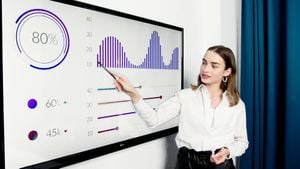From artistic endeavors to innovative robotics, the world of space exploration is as vibrant as it is complex. With missions like NASA's Europa Clipper aiming to probe the icy depths of Jupiter's moon Europa, and the ESA Academy's robotics workshops training the next generation of engineers, there's much happening behind the scenes and above the clouds.
NASA is known not just for its scientific advancements, but for its creative outreach efforts as well. Recently, the team working on the Europa Clipper mission took it upon themselves to transform what could have been just another mundane piece of spacecraft hardware—a flat metal plate—into something much more meaningful. They reached out to Preston Dyches, Senior Public Engagement Specialist at NASA's Jet Propulsion Laboratory, with the idea to engrave waveforms of the word "water," the universal essence of life, presented in various languages from around the globe.
The goal was to forge connections between Earth and Europa, which is believed to harbor conditions suitable for life under its icy shell. Dyches explained, "Water connects these two worlds. One is teeming with life, and the other might just possess the right conditions for some form of life of its own." The concept was inspired by the Golden Records carried by the Voyager spacecraft, which serve as time capsules of humanity.
Creative input flowed from collaborators like Debbie Millman, who was approached by JPL Visual Strategist Dan Goods. Millman, who has long had a passion for space, dove headfirst (figuratively, of course) when presented with this unique opportunity. Initially, she and the team considered leading with the word "water" itself or possibly even letting native speakers design the actual words. The breakthrough came when one linguist suggested visualizing waveforms, resulting from people saying "water" across 103 different languages.
Through numerous iterations, Millman settled on a design inspired by the Big Bang, with the word emanate from a core design based on the American Sign Language sign for water. This symbolized humanity's universal connection through the fundamentally life-giving element. Meanwhile, the back side of the plate features an original poem by U.S. Poet Laureate Ada Limón, alongside other cosmically themed elements such as the famous Drake Equation, which theorizes the possibility of extraterrestrial life.
Over the ocean on the other side of the world, Europe is equally committed to bringing fresh talent to the forefront of space exploration. The European Space Agency (ESA) recently hosted its annual Robotics Workshop, bringing together 30 university students from 14 different member countries and Canada. This hands-on program focused on developing skills necessary for designing and operating 3D-printed rovers, modeled after the forthcoming Rosalind Franklin ExoMars rover.
ESA robotics engineer Marti Vilella Ramisa led the initiative, stating, “The goal was to introduce them to designing and operating a 3D-printed rover.” Over four intensive days, students learned the ropes of rover locomotion and algorithms, tweaking the ROS 2 Robot Operating System, primarily coded using Python programming.
Activities offered participants everything from foundational robotics lectures to practical sessions where they tested their designs on simulated Mars terrain using wireless gamepads. One of the highlights was to create multiple locomotion modes for their ExoMy rovers, which are equipped with onboard cameras for image detection.
By using machine learning techniques, teams were able to teach their rovers how to autonomously locate and interact with objects—like locating and approaching specific target balls scattered across the terrain. “The culminating task was to integrate locomotion and image recognition to autonomously locate and approach the ball, even when the ball’s position was unknown. This proved complex but highly rewarding,” Ramisa added, expressing pride at how all teams met and even exceeded expectations.
Upon completing the workshop, students presented their final projects, received evaluations, certificates, and even gained credits recognized under the European Credit Transfer and Accumulation System (ECTS). It was all part of ESA Academy's wider mission to inspire and educate those eager to contribute to the future of aerospace.
Back at NASA, the concept of art meeting science continues to flourish, most recently embodied by this unique panel destined for Europa. It's set to travel along with the spacecraft on its ambitious mission to reach Jupiter's icy moon by 2030. Dyches noted the incredible connection this project embodies—making something quite small on the cosmic scale represent the infinite possibilities life might hold on other worlds.
By taking the time to highlight water—a substance connecting all life on Earth and potentially Europa—the Europa Clipper serves both scientific and artistic ends. While scientists probe the depths of the moons orbiting distant planets, creatives at home are busy ensuring these explorations resonate deeply with folks back on Earth—from childlike musings on space to the tangible aspects of scientific discovery. Connecting art and science might just be the true essence of the future we’re building beyond our atmosphere.
The intersection of creativity and technology, whether through workshops or artistic installations, demonstrates how space exploration can unite us all—even millions of miles away. The future looks bright, and the stars are calling. Perhaps one day, the work of today’s engineers, artists, and scientists will lead humankind to discover not just new worlds but new understandings of one another as well.



